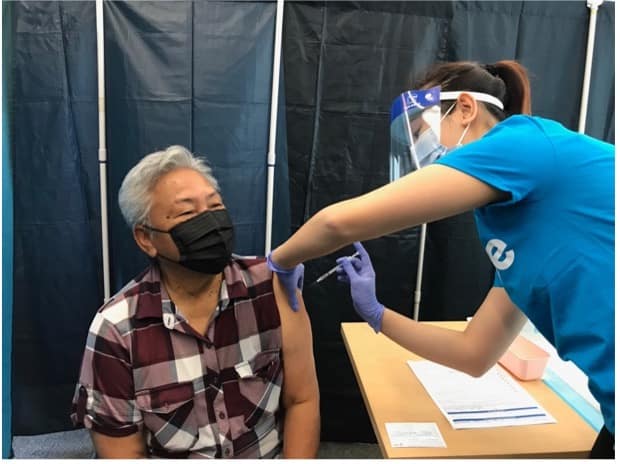
The COVID-19 pandemic placed a threat over Hawaiʻi that caused new restrictions and health protocols that we have been navigating for a year now.
Our community has been hit especially hard—with Native Hawaiians accounting for about a quarter of positive COVID-19 cases in Hawaiʻi. Many of those cases were on Oʻahu’s West side.
As part of Phase 1B of Hawaiʻi’s vaccination distribution plan—kūpuna age 75 and older and essential workers became eligible to receive the COVID-19 vaccine.
On February 24, 2021, the Council For Native Hawaiian Advancement (CNHA) and Kaiser Permanente partnered to distribute vaccines into the communities that need them the most.
It was the first of what may be several community vaccination clinics primarily aimed at reaching Oahu’s Hawaiian Homestead communities on the West side.
“There are plenty of people who have been nervous and scared about getting the vaccine, and there are a bunch of areas where it’s not opportune to come out to mass vaccination sites or even to some of our clinics. So, to be able to come and meet them where they live and work is an incredible opportunity,” said Kaiser Permanente’s Dr. Zamir Moen.
A majority of the 108 Pfizer vaccine doses available that day went to kūpuna who expressed deep appreciation.
“I wasn’t planning to get a shot because it’s in town,” explained Margaret Purdy. “I don’t drive that far—maybe just a ten-mile radius from my house, so this is good—close to home.”
Aileen and Albert Caminos walked to their appointment. They live right around the corner from the Kapōlei Heritage Center. “We came for safety,” they said. “We don’t want our children and great grandchildren to get sick. We want our whole family to get vaccinated.”
The Caminos love to travel and were hoping to make a trip to Las Vegas in March—but they canceled it over health and safety concerns. They are looking forward to rescheduling it once it’s safe and their vaccines take full effect.

Those who received the vaccine at the CNHA clinic shared the sentiment that they were there to mālama their ʻohana and their community.
“My husband just had a heart transplant recently. He will be coming home from California with a new heart, and he is on immunosuppressant medication, so I need to make sure I am not transferring anything to him,” shared residential appraiser Maile Tiwanak, who wears a mask and a face shield when she works each day.
Tiwanak, the Caminos, Aunty Margaret and everyone who received their first shot at this inaugural CNHA clinic, will receive their next dose on March 24th.
“We want to help our community get back to a place where it is safe to gather responsibly, where we can enjoy being together and doing what we love, with the people we love the most,” said Kūhio Lewis, CNHA President & CEO. “If they cannot make it to a big clinic, we will bring a smaller clinic to them. It is a vital step to not only protect our most vulnerable members, but to also help our community thrive.”
